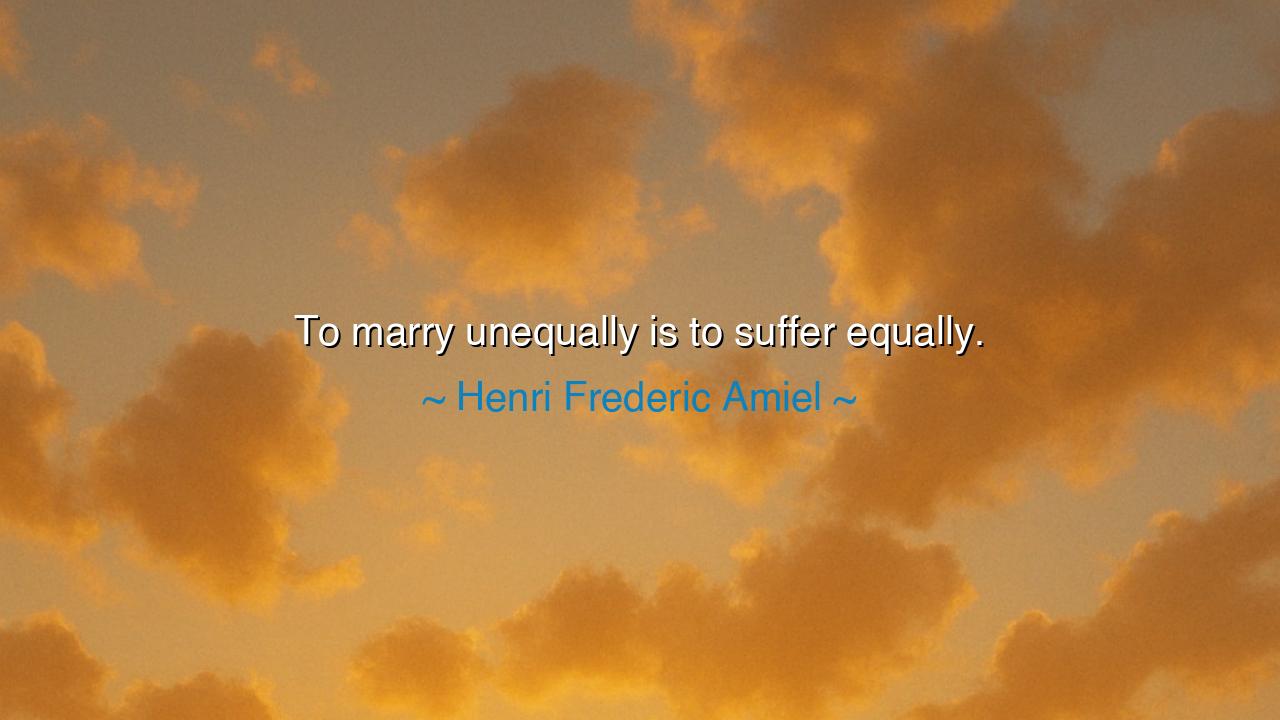
To marry unequally is to suffer equally.






Hearken, children of the ages, to the words of Henri Frederic Amiel, the sage of human reflection: "To marry unequally is to suffer equally." Here lies a teaching of discernment and the sacred gravity of union. Amiel warns that a bond formed without equality—whether in heart, mind, or spirit—carries within it the seeds of shared sorrow. The marriage of mismatched souls may seem alluring, yet its consequences ripple through both lives with relentless impartiality.
Know that in these words there is both caution and insight. To marry unequally is to invite imbalance, where one heart may overreach while the other recoils, and one will struggle to fill gaps the other cannot perceive. The suffering is not the burden of one alone; it spreads equally across both, for the law of the heart is impartial, and discord touches all who dwell within the union. The ancients would counsel that equality in love is the foundation of harmony, and its absence the herald of continual struggle.
Yet, consider also the subtle wisdom of choice. Marriage is not a transaction of convenience, nor a mere alignment of circumstance. It is a covenant of souls, requiring the resonance of values, desires, and purpose. To ignore the necessity of equality is to court frustration, bitterness, and a quiet erosion of intimacy. Amiel’s reflection teaches that foresight and discernment are as vital to the heart as passion and affection.
And behold, there is heroism in prudence. To seek equality in marriage is not mere caution, but the courage to honor oneself and the beloved. The true measure of marriage is not in ceremony or appearance, but in the balance of mutual respect, shared endeavor, and reciprocal devotion. When the scales of the heart are even, joy may flourish; when they tilt, suffering follows without partiality.
Thus, remember, future generations: the union of souls is sacred, and its success lies in equality of spirit, mind, and purpose. To marry unequally is to invite the weight of shared pain, yet to choose wisely is to craft a bond of enduring strength, harmony, and shared fulfillment.
In the end, the ancients would say: weigh the heart as carefully as the vows, for imbalance in love is a hidden peril. The law of human connection is merciless in its justice; when equality is absent, suffering will touch both lives alike. Let foresight, discernment, and shared values guide the sacred path of marriage, so that the union may be a source of light rather than shadow.






TDtrung duc
I find this quote quite thought-provoking because it makes me think about the complexity of relationships. Is ‘suffering’ inevitable when two people come from different worlds, or can those differences actually complement each other? How do we distinguish between healthy challenges that help a marriage grow and the kind of imbalance that leads to suffering? Could mutual respect and understanding overcome inequality, or is it always a source of conflict?
YNyen ngoc
This quote seems to imply that inequality in a marriage always results in suffering, but I’m not sure if I agree with that. Could there be instances where differences in power or status create opportunities for growth and learning in the relationship? How do we define inequality—does it always have to be about external factors like money or class, or can it also be about emotional maturity and communication?
YC09- Do Duong Yen Chau
I understand the perspective that unequal marriages may lead to suffering, but I also wonder if this is always the case. Could it be that people in unequal marriages learn how to navigate those differences, becoming stronger together? What about couples who have different backgrounds but still find ways to understand and respect each other’s differences? Can the relationship thrive despite inequality, or does it always lead to pain?
KHDang Le Khanh Huyen
Henri Frederic Amiel’s quote raises an interesting point about the consequences of marrying someone from a different status or background. But does this mean that marriages where partners are ‘unequal’ in some way are doomed to suffer? Can such differences actually enrich a relationship, creating opportunities for growth? Is suffering always a negative outcome, or can it be a challenge that strengthens a bond in the long run?
TKDạng Thùy Khang
This quote suggests that an unequal marriage can bring suffering for both partners, which makes me wonder about the nature of inequality in relationships. Is it always about social status, wealth, or education, or could it be emotional or psychological imbalance? How can we identify when a marriage is unequal, and what steps can be taken to address the imbalance without causing harm to both parties?